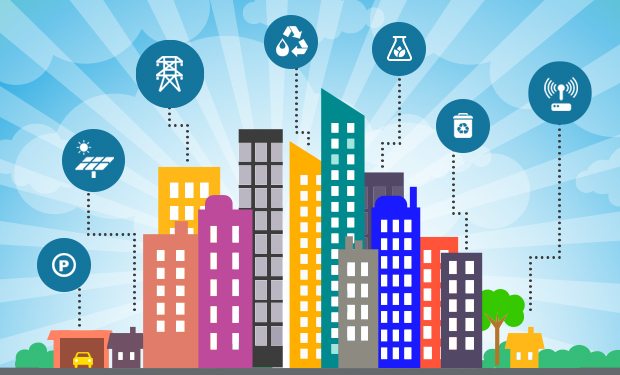AT&T, GE, Intel, Harman and others were busy showing off their smart city products and services at Mobile World Congress 2017. Themes at the show included “5G,” artificial intelligence, the internet of things,” virtual reality and augmented reality, but smart cities are one of the most exciting and rapidly growing areas in the wireless industry. Increasingly, there are many smart city conferences all around the world. They are very exciting and they involve many different industries working together.
What is a smart city? Simple question, but a much more complex answer. Smart city is using wireless and wireline technology, IoT, AI, 5G and a host of other sectors to create a virtually automated city. There are so many potential benefits like reduced cost, improved safety, better health, automated and safer driving.
In fact, the meaning of smart city is continually changing and expanding, and this will continue for years to come. There are so many companies in so many industries getting their feet wet in this smart city growth wave.
At MWC, AT&T announced they have joined with Current, which is a GE division, to deliver IoT technology to cities in the United States and Mexico. AT&T will also be the exclusive reseller of GE intelligent sensor nodes. They work with cameras and sensors and are installed on light poles or power poles and work with lights from a variety of companies. Data is transmitted over the AT&T Mobility LTE wireless network and then connected to a fiber link.
All this is used to control and manage a city. This will create an enormous cost savings to cities, which can help them continue to invest in the smart city model going forward. Smart cities will start out being something to capture our imagination, but before long they will be what citizens of every city may want and demand. In the early years, this smart city technology will attract citizens and companies, which will increase tax revenues. That’s music to the ears of every city.
Eventually, the smart city will become just a standard cost of business. Cities that do not jump on this smart city bandwagon may be left behind in the next, big growth wave that is now beginning.
Not every city will be interested in becoming a smart city. Some will buck the trend, while others may be small towns without the budget or interest in all this technology and will prefer to stay the way they are. There are no rights or wrongs, just differences. However, different cities will have different levels of smart city technology.
Some will completely turn to the smart city model. At the other end of the spectrum, many cities will just use some smart city technology to improve safety or to save money. Perhaps they will use intelligent traffic control, or choose a feature here and there.
Harman announced at MWC their early detection and warning system designed to help cities monitor utilities. Harman Quick Predict senses vibration and combined with Intel technology can help smart cities and connected devices like smart cars or connected cars.
MWC 2017 shows smart city technology coming on strong
Any way you slice it, smart city technology is coming on strong. This will be a real growth sector for investment and employment. Something to focus on going forward for you and your children for years to come.
Saving money will be an early attractant for cities, but long-term the data from sensors all over town will be shared by the entire smart city consortium, making our lives better and very different.
Let’s continue to build and learn about this new opportunity. Today, we are still in the early, Fred Flintstone days of the smart city phenomenon. It will continue to get bigger, better and stronger. A great place to focus for investment and employment.
Jeff Kagan is a wireless analyst, telecom analyst, technology analyst, consultant, speaker and author.

